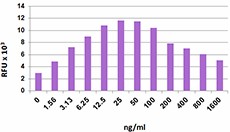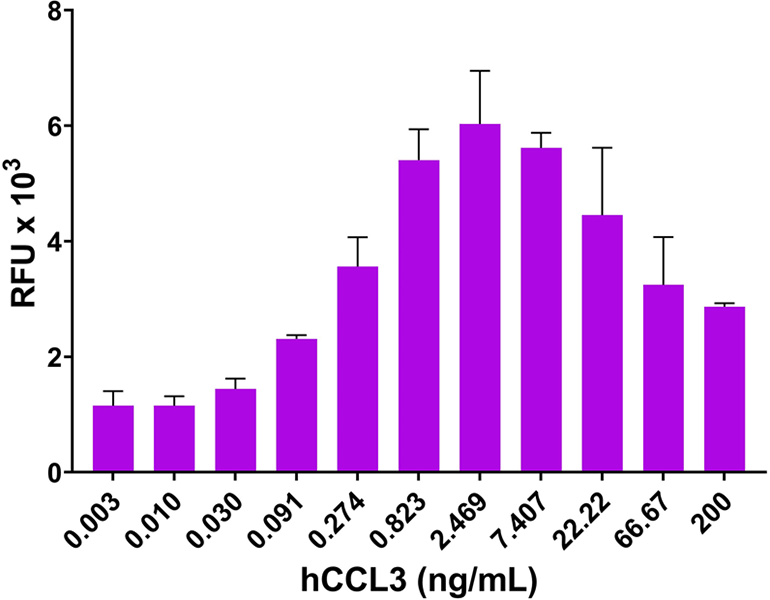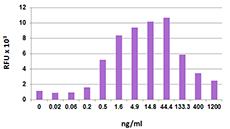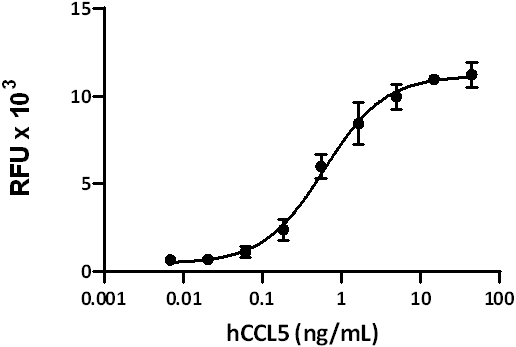- Regulatory Status
- RUO
- Other Names
- Monocyte chemotactic protein 2 (MCP-2)
- Ave. Rating
- Submit a Review
- Product Citations
- publications

-

THP-1 cells chemoattracted by human CCL8.
| Cat # | Size | Price | Save |
|---|---|---|---|
| 581602 | 10 µg | ¥43,390 | |
| 581604 | 25 µg | ¥80,600 |
CCL8, also known as MCP-2, is a beta chemokine initially isolated from human MG-63 osteosarcoma cells stimulated with IL-1β. CCL8 (MCP-2) has structural and functional similarity with MCP-1 and MCP-3, and it is often co-induced with those chemokines in mononuclear cells. IFNγ is a strong inducer of CCL8 in monocytes and fibroblasts. CCL8 can be processed and secreted as a truncated chemokine CCL8 (6-75). This isoform does not chemoattract monocytes, but it binds to the CCR2 receptor and induces its internalization; as a result, CCL8 inhibits MCP-1 (CCL2) and MCP-2 (CCL8) ERK signaling and antagonizes the chemotactic activity of several CCR2 ligands (MCP-1/CCL2, MCP-2/CCL8, MCP-3/CCL7). CCL8 is highly expressed in the skin, and it serves as an agonist for the chemokine receptor CCR8, but not for CCR2. Therefore, it has been speculated that the CCL8-CCR8 interaction is a crucial regulator of Th2 cell homing, which drives IL-5-mediated chronic allergic inflammation. In addition, CCL8 binds CCR5 receptor with high affinity and inhibits the replication of human immunodeficiency virus type 1. CCL8 is highly expressed in different human diseases, and it is a potential biomarker for the diagnosis of graft-versus-host diseases and tuberculosis.
Product DetailsProduct Details
- Source
- Human CCL8, amino acids Gln24-Pro99 (Accession# NM_005623.2) was expressed in E. coli.
- Molecular Mass
- The 76 amino acid recombinant protein has a predicted molecular mass of approximately 8.9 kD. The DTT-reduced protein migrates at approximately 11 kD and non-reduced protein migrates at approximately 12 kD by SDS-PAGE. The N-terminal amino acid is Gln.
- Purity
- >98%, as determined by Coomassie stained SDS-PAGE.
- Formulation
- 0.22 µm filtered protein solution is in PBS.
- Endotoxin Level
- Less than 0.01 ng per µg cytokine as determined by the LAL method.
- Concentration
- 10 and 25 µg sizes are bottled at 200 µg/mL. 100 µg size and larger sizes are lot-specific and bottled at the concentration indicated on the vial. To obtain lot-specific concentration and expiration, please enter the lot number in our Certificate of Analysis online tool.
- Storage & Handling
- Unopened vial can be stored between 2°C and 8°C for up to 2 weeks, at -20°C for up to six months, or at -70°C or colder until the expiration date. For maximum results, quick spin vial prior to opening. The protein can be aliquoted and stored at -20°C or colder. Stock solutions can also be prepared at 50 - 100 µg/mL in appropriate sterile buffer, carrier protein such as 0.2 - 1% BSA or HSA can be added when preparing the stock solution. Aliquots can be stored between 2°C and 8°C for up to one week and stored at -20°C or colder for up to 3 months. Avoid repeated freeze/thaw cycles.
- Activity
- Bioactivity was measured by its property to chemoattract human THP-1 cells in a dose dependent manner.
- Application
-
Bioassay
- Application Notes
-
BioLegend carrier-free recombinant proteins provided in liquid format are shipped on blue-ice. Our comparison testing data indicates that when handled and stored as recommended, the liquid format has equal or better stability and shelf-life compared to commercially available lyophilized proteins after reconstitution. Our liquid proteins are verified in-house to maintain activity after shipping on blue ice and are backed by our 100% satisfaction guarantee. If you have any concerns, contact us at tech@biolegend.com.
Antigen Details
- Structure
- Chemokine
- Distribution
-
Fibroblast, endothelial cells, monocytes, and macrophages.
- Function
- CCL8 chemoattracts monocytes, T cells, NK cells, mast cells, eosinophils, and basophils. CCL8 is induced by IL-1β, IFNβ, INFγ, dsRNA, virus, ConA, and anti-CD2. The induction of CCL8 by IFNγ synergizes with the TLR ligands peptidoglycan (TLR2), dsRNA (TLR3), and LPS (TLR4).
- Interaction
- Monocytes, T cells, NK cells, mast cells, eosinophils, and basophils.
- Ligand/Receptor
- CCR1 (CD191), CCR2 (CD192), CCR3 (CD193), and CCR5 (CD195).
- Biology Area
- Cell Biology, Neuroinflammation, Neuroscience, Signal Transduction
- Molecular Family
- Cytokines/Chemokines
- Antigen References
-
1. Van Damme J, et al. 1992. J. Exp. Med. 176:59.
2. Proost P, et al. 1998. J. Immunol. 160:4034.
3. Dean RA, et al. 2008. Blood 112: 3455.
4. Hori T, et al. 2008. Blood 111:4403.
5. Rom S, et al. 2010. FASEB J. 24:2292.
6. Struyf S, et al. 2009. Eur. J. Immunol. 39:843.
7. Islam SA, et al. 2011. Nat. Immunol. 12:167. - Gene ID
- 6355 View all products for this Gene ID
- UniProt
- View information about CCL8 on UniProt.org
Related Pages & Pathways
Pages
Related FAQs
- Why choose BioLegend recombinant proteins?
-
• Each lot of product is quality-tested for bioactivity as indicated on the data sheet.
• Greater than 95% Purity or higher, tested on every lot of product.
• 100% Satisfaction Guarantee for quality performance, stability, and consistency.
• Ready-to-use liquid format saves time and reduces challenges associated with reconstitution.
• Bulk and customization available. Contact us.
• Learn more about our Recombinant Proteins. - How does the activity of your recombinant proteins compare to competitors?
-
We quality control each and every lot of recombinant protein. Not only do we check its bioactivity, but we also compare it against other commercially available recombinant proteins. We make sure each recombinant protein’s activity is at least as good as or better than the competition’s. In order to provide you with the best possible product, we ensure that our testing process is rigorous and thorough. If you’re curious and eager to make the switch to BioLegend recombinants, contact your sales representative today!
- What is the specific activity or ED50 of my recombinant protein?
-
The specific activity range of the protein is indicated on the product datasheets. Because the exact activity values on a per unit basis can largely fluctuate depending on a number of factors, including the nature of the assay, cell density, age of cells/passage number, culture media used, and end user technique, the specific activity is best defined as a range and we guarantee the specific activity of all our lots will be within the range indicated on the datasheet. Please note this only applies to recombinants labeled for use in bioassays. ELISA standard recombinant proteins are not recommended for bioassay usage as they are not tested for these applications.
- Have your recombinants been tested for stability?
-
Our testing shows that the recombinant proteins are able to withstand room temperature for a week without losing activity. In addition the recombinant proteins were also found to withstand four cycles of freeze and thaw without losing activity.
- Does specific activity of a recombinant protein vary between lots?
-
Specific activity will vary for each lot and for the type of experiment that is done to validate it, but all passed lots will have activity within the established ED50 range for the product and we guarantee that our products will have lot-to-lot consistency. Please conduct an experiment-specific validation to find the optimal ED50 for your system.
- How do you convert activity as an ED50 in ng/ml to a specific activity in Units/mg?
-
Use formula Specific activity (Units/mg) = 10^6/ ED50 (ng/mL)














Follow Us